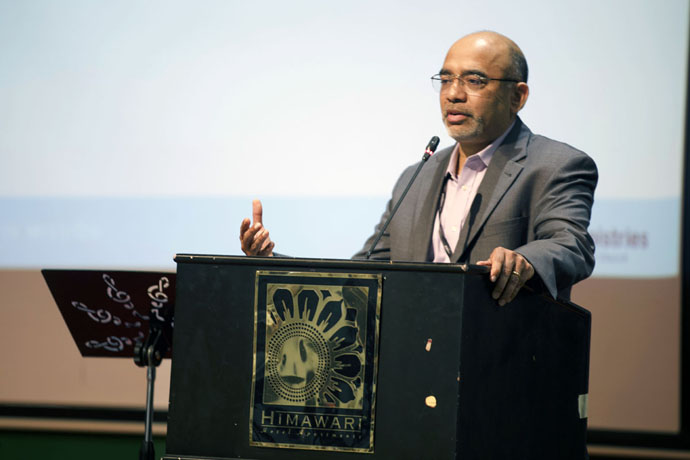Key Points:
- Roland Fernandes of the United Methodist Board of Global Ministries will add overseeing the United Methodist Board of Higher Education and Ministry to his duties on July 1.
- The Rev. Greg Bergquist retires June 30 as top executive of Higher Education and Ministry but will stay on through 2024 as a deputy to Fernandes.
- The move may be a precursor to other shifts at boards and agencies as finances tighten in The United Methodist Church.
A portent of the future of The United Methodist Church may have recently emerged in Cambodia, with the news that the top executive of the United Methodist Board of Global Ministries would add the Board of Higher Education and Ministry to his responsibilities.
The announcement, during the fall board meeting of Global Ministries in Phnom Penh, raised questions, some of which can’t be answered immediately.
- Are the two agencies merging, now or down the line?
- Will there be job cuts as executives look to take advantage of economies of scale?
- Is this move to some degree about cutting costs as the denomination addresses increasingly tighter budgets, exacerbated by church disaffiliations?
The short answers are “No,” “Not now” and “Maybe.”
“It’s very important that we understand that this is not a merger,” said Roland Fernandes, top executive of Global Ministries and the United Methodist Committee on Relief.
“This is not a first step towards the next step,” he said. “There’s no such next-step plan at this moment in time.”

Fernandes will take over for the Rev. Greg Bergquist as Higher Education and Ministry’s top executive on July 1 following Bergquist’s retirement, which takes effect June 30. However, Bergquist will stay on as deputy to Fernandes at least through next year.
“If you look at the four missional focus areas for Global Ministries (make disciples of Jesus Christ, strengthen Christian congregations and communities, alleviate human suffering and seek justice, freedom and peace), education fits right alongside those four,” Bergquist said.
“GBHEM will continue to hold the expertise around higher education, theological education and ordination credentialing, and then Roland will be essentially the CEO that will help to manage some kind of executive leadership team that is working together for both agencies.
“So, the educational expertise will be maintained at GBHEM,” he said.

The fact that the two boards will remain separate entities is key, said Dawn Wiggins Hare, top executive of the United Methodist Commission on the Status and Role of Women and convener of the General Secretaries Table, which brings together the top executives of the denomination’s general agencies.
“I think folks are willing to try something different,” Hare said. “I think it's reassuring to all the agencies that they realize the importance of maintaining boundaries as two programmatic entities. These two parts of the body are important, and can't be mushed together.”
There have been budget reductions in the denomination for some time now, as boards and agencies prepare for the future. In addition, conferences have approved the disaffiliations of more than 6,600 United Methodist churches so far due to a variety of factors, and those departures will further affect monetary support for boards and agencies. That represents the exit of about 22% of U.S. congregations since 2019.
“Clearly, we have to deal with the financial challenge that actually the whole denomination is looking at,” Bergquist said. “We're taking seriously the financial challenge and trying to be good stewards of denominational funds.
“But it's really first and foremost focused on missional and operational alignment.”
The Rev. Laceye Warner, an associate professor of Methodist Studies at Duke Divinity School, said the announcement is “good news” for the denomination.
“It's always better to have the complexity or the layers of our ministry connected,” Warner said.
She acknowledged that such moves “might push comfort levels or boundaries.”
“How’s the work going to get done and who’s going to do it, and how to distribute resources? And then is this a part of a longer decline?” she said. “But we do need synergy and collaboration in our work, and to have a global perspective on our work generally is good news for the denomination in the 21st century.”
Both Bergquist and Fernandes said there are no plans for job cuts at this time.
“There is no plan for people to lose jobs,” Fernandes said. “Now, you know, what General Conference from the budget does after that, that’s something we will have to look at, that's a different issue. But in terms of the plan itself, it’s not about people losing jobs. It’s about, ‘How can we be more effective programmatically?’”
Bergquist noted that Higher Education and Ministry already has had significant job reductions. That is true for many of the denomination’s general agencies, which have been making post-pandemic cutbacks and reducing their full-time staff either through layoffs or by leaving positions vacant.
Subscribe to our
e-newsletter
The denomination’s General Council on Finance and Administration is proposing a 2025-2028 denominational budget of about $370.5 million to next year’s General Conference, the denomination’s top policymaking assembly. The new bottom line marks a nearly 40% reduction from the denomination-wide budget that General Conference approved at its last regular meeting in 2016.
Bishop Grant Hagiya, a retired bishop in The United Methodist Church and now president of Claremont School of Theology, served on the Global Ministries board for many years and one term on the board of Higher Education and Ministry.
He said even if cost-cutting isn’t the most important factor in the changes at the two boards, the move could be a good early strategy if more has to be slashed from budgets later.
“I'm sure that’s in the back of their mind,” he said. “If you do it with a sense of creative purpose, then you get better even if you get smaller.
“That’s what I would hope that they would be thinking through to.”
As the leader of one of the 13 United Methodist seminaries in the U.S., Hagiya believes similar changes may be in store across the denomination.
“I think it is a bold move in terms of the downsizing of The UMC,” he said. “Seminaries are not going to survive unless we start collaborating and doing partnerships and things like that.
“So, it's a wave of our UMC near-future that's going to have to take place.”
Other agencies are looking into how costs might be lowered if need be. Hare noted that funding for smaller agencies such as the Status and Role of Women has been largely protected from cuts so far.
“I think (boards and agencies) are willing to try something different,” she said. “Is there a way for us to share services in certain particular areas for us to exercise increased stewardship and to be efficient?”
At United Methodist Communications, which includes United Methodist News, leaders are “evaluating all of our services and work in light of adapting to new budget realities,” said Dan Krause, the agency’s top executive. “This will require internal changes in what we are doing.
“We are also partnering with other agencies to integrate communications into denominational channels to better serve United Methodist members and leaders, while eliminating duplicative costs,” Krause added. “We’ve done this with (Status and Role of Women) fully and with United Methodist Men and the (United Methodist Commission on Archives and History) in some areas. We continue to be in dialogue with other agencies.”
More duplication of efforts across the boards and agencies could stand a look, Hagiya said.
“I was always struck when I was in the process, the general agencies duplicate almost everything,” he said. “It's sort of like the military, where every branch of the military duplicates other sources.
“We've got to come to some better way of doing things organizationally.”
Patterson is a UM News reporter in Nashville, Tennessee. Contact him at 615-742-5470 or newsdesk@umcom.org. To read more United Methodist news, subscribe to the free Daily or Weekly Digests.




